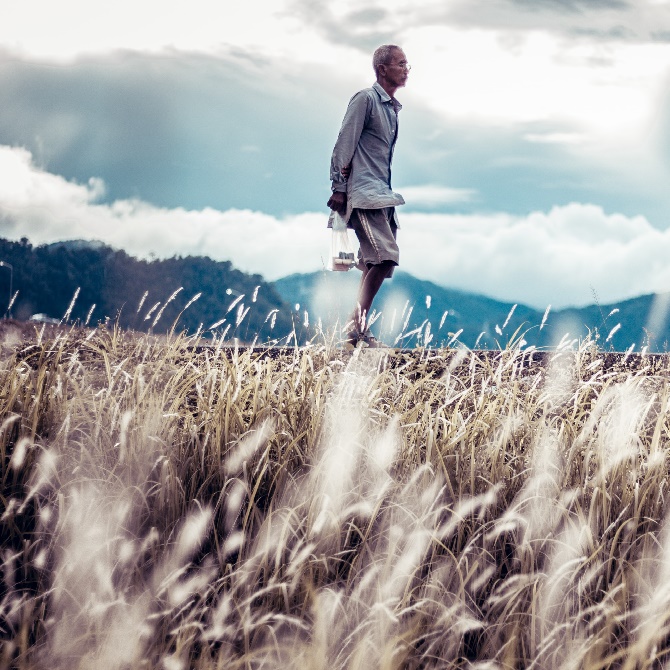The Fields are High
Extract…
EVERY MORNING Esther took the two pints of milk in the blue jelly jar up to the Whites.
This was a concession; for Belle, Esther’s mother, brooked no nonsense of sending milk to her customers. “Leh who wan’ milk come fo’ all gone,” she used to tell them when they came late and complained because she had no more to sell. But then, Mrs. White was a lady, and Mr. White was foreman at the newspaper office In the city, and Hedie, their little brown-skinned girl, used to cycle by fast to school, holding the skirt of her smart blue uniform down on her legs with one hand, her two black plaits bowed with red ribbon long down in her back. Yes, Mrs. White was a lady, and Belle didn’t mind sending milk to a lady who never went to town without her gloves and veil.
And on the first of every month, too, Esther would bring back the money for the last month’s milk wrapped in a piece of paper, tightly clenched in the palm of her small hand.
Esther only carried the morning milk; in the evening the girl who did for the Whites came for it.
Esther loved to set out early on mornings, before the last stars had gone, and take the high road that led over Craig’s Hill to Duke’s Village where the Whites lived. For then she could mount the two foot wall that bordered the left side of the road where the land fell away, and walking along, could watch the sun rise way away cross the fields and feel its warm touch on her cheek, until Dr. Fullerton’s high wall rose in her face and she had to jump back on to the road.
But that morning Belle had forbidden her to go that way. “Don’t you go nuh Craig’s Hill way fo’ me,” she had told her as she was about to set out. “The canes high, an’ they got wosless, lawless people ‘bout. D’you hear ?“
That meant she would have to take the other way, along up Government’s Road, through Bethel’s Tenantry and drop into Duke’s Village from the back. Esther didn’t like that way much. That way seemed so lonely and strange, with only the big, sleeping houses and that high wall that hid the sun long after it had risen. Besides, there was a huge dog that always hurled itself against a gate and roared its awful, blood-thirsty roar from out its bowels at her as she passed. It couldn’t get over, but it frightened her all the same.
She walked along slowly, her rounded little arms thrown up, holding the jar of milk on her head, and turned right up the grey asphalt main road. About twenty yards up she stopped, undecided, where the road went off into a Y.
At last she turned left, taking the road that she wanted. There would be something to pay if her mother knew, but she’d never know. As she walked on she let go the jar on her head, counting the number of steps she could take before she had to clutch it again. She wondered why Belle and Aunt Oph, tall women that looked awfully big to a little girl, should so fear anyone, even a man in the canes. Esther thought she would like to see him, anyway. She wouldn’t never be afraid. She’d talk to him, and ask him why he made Belle and Aunt Oph and the people from the village so scared to walk Craig’s Hill road when the canes were high. And she’d ask him, too, if the men who went through cutting the canes in the crop never found him, and where he used to live when the fields were low, and what he used to eat. She’d make friends with him, and then she’d tell Ma and Aunt Oph that they never had to be afraid to walk Craig’s Hill any more.
She reached where the wall started, and clutching the jar of milk to her in the crook of her hand, mounted and walked along the narrow ledge. After a while she stopped, and turning, fronted the wide, crimson dawn, and the low, misty country that rolled before her in all its golden-touched, variant greenery. There she stood, her slender little self erect, her dark, sun-splashed face wide-eyed and eager, the lips folded in tight. Then she thought she would see how the sun looked on the tall canes behind her, and snapped her head round over her shoulder quickly.
For one second she caught glimpse of the face peering at her from between the tall canes on the fringe of the field. A face bony and gaunt, with lots of hair about it, the hooded eyes red and unblinking as an animal’s, the strong, yellow teeth showing through a wry, friendly smile. Esther turned quickly, but before she could jump on to the road the face had gone, and she heard a rustling as the man’s body moved back into the canes. She crossed the road and stood for a long time in the damp, dewy strip of grass that ran between the fields and the highway, poking her head this way and that, peering between the tall, crooked stems. At last, disconsolate, she came off the grass back on to the road and continued on her way slowly, her head screwed round to the right, searching the high fields as she passed. ….
